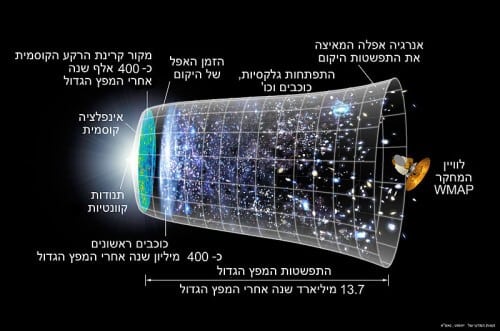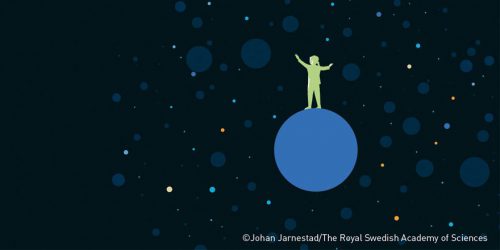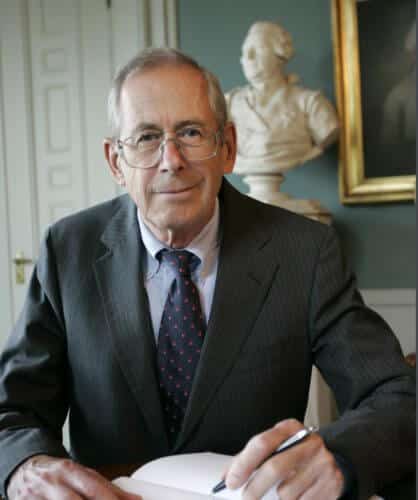This is how Prof. Yoel Rafali from Tel Aviv University and Peebles's colleague describes the winner of the 2019 Nobel Prize in an interview with the scientist website

James or Jim Peebles, led the theoretical research in cosmology, we met at conferences and I read his articles eagerly and learned a lot from them. This is what Prof. Yoel Rafaeli from the School of Physics and Astronomy at Tel Aviv University says following Peebles winning half of the 2019 Nobel Prize in Physics.
"I know him from conferences and visits to Princeton University, and of course through his works. When I was doing a doctorate in the late seventies it was very close to one of the subjects that are the basis of the importance of Peebles' research, which led to this day of the awarding of the Nobel Prize. The professor who presented the work addressed this: the understanding that the physical details are of great importance in understanding the period we call the splicing period when the cosmic matter transforms from plasma - free charged particles that join together to form the hydrogen atom and then are the basis for the other elements as well."
"James Peebles mentioned in a conversation at the press conference on the occasion of the announcement of the winners in physics this morning the tremendous contribution of Prof. Jacob Zeldovitz, a Jew who worked in the Soviet Union at the same time or even a little before Peebles and was the world's leader in theoretical research in cosmology. He wasn't the first either, because right after the publication of general relativity, Alexander Friedman was the first to solve the field equations and conclude that the universe is expanding, but the mechanism was still unknown. Zeldovich Peebles and their colleagues, understood what processes happen during this important transition. When the ionized matter turns into atoms, mainly of hydrogen and the most important among them is the separation between the cosmic radiation field (the cosmic background radiation) and the matter. They understood the meaning of this process, and predicted what signatures it should leave in the cosmic background radiation, which was and still is one of the main fields of research in cosmology."


According to Prof. Rafaeli, the theoretical research began close to the discovery of the cosmic background radiation in 1964. This radiation, which was predicted by theoretical physicists including George Gamow, Ralph Alfer and Robert Herman, was discovered by chance by two physicists from "Bell Laboratories", Arno Panzias and Robert Wilson, a discovery for which they later won the Nobel Prize in Physics. "Then began the precise measurements of the cosmic background radiation and the detailed understanding of how the universe developed following the entire theoretical description that Peebles contributed to it. All of this became much more significant when NASA launched the first cosmological satellite - Kobi, which for the first time very accurately measured the spectrum of the cosmic background light and above all the great importance was in measuring the lack of isotopy to a small degree that was predicted based on theoretical calculations and is of great importance in our understanding of the great structure of the universe, including the fact that the spectral signatures some of which were measured already then, and then also with more sophisticated telescopes that were launched later, were used for a long period of time as the main tool for determining the important parameters for the nature of the universe, its age, the degree of curvature - the geometric structure, the amount of ordinary matter, its size , the dark matter and later also the dark energy.”
"Peebles' other important contribution was the development of the field of statistical cosmology. He developed a statistical understanding to describe the larger structure of the universe. - Peebles contributed significantly and in a unique way to the development of the statistical method that describes in a statistically precise way with the help of statistical flags correlation functions, values of important parameters, average values, etc.,
"His research on the connection period and the statistical methods he developed are the important contributions of Gene Peebles and for which he receives the award." Prof. Rafaeli concludes.
More of the topic in Hayadan:
- The discoverers of the first planet outside the solar system and the key to the cosmological theory were jointly awarded the Nobel Prize in Physics
- Misconceptions about the Big Bang
- The rate of expansion of the universe is controversial - and we may need new physics to quantify it
- Will gravitational waves be able to shed light on the expansion rate of the universe?

3 תגובות
It seems that the award committee did everything in its power not to award Peebles the award. Only when they saw that he was not showing any signs of "going to die", they gave in and gave him the reward in El Korahem. But still they had to spoil the celebration for him and attached "partners" who are not at all in the order of his huge size. After all, the man is a real scientific giant, third-fourth perhaps only to Albert Einstein in his own right, to Isaac Newton and Johann Carl Friedrich Gauss.
All the cosmological discoveries of the last 50 years are named after him:
Also the cosmic background radiation
Also the dark matter
And also the dark energy
In the committee's opinion, what else did he have to discover and prove in order to be worthy of receiving the entire award?
Maybe they expected him to reveal the secret to eternal life?
If that's how he is, then he (yet(!)) didn't find out that he disappointed you.
The universe contains a lot of knowledge and humans have not yet reached a fraction of it, theories change from time to time, the Nobel Prizes will be given in the future to new theorists.
For perspective: Peebles has been leading the field of theoretical cosmology for at least 50 years. He was looking for evidence of the cosmic background radiation before AT@T engineers were able to invent an antenna and microwave amplifier capable of finding it, and when they came to him asking what the strange signals they detected coming from space were, Peebles immediately recognized the importance of the discovery and how what was perceived as "electronic noise" on the server The media is an authentic signature of the "Big Bang", which was previously perceived as "speculation" without a positive view. The two engineers received the Nobel Prize for Physics 40 years ago, even though their contribution to the understanding of the discovery is zero, but Peebles had to wait until this year, because the Nobel Prize committee has a bias against theorists and in favor of experimentalists, even before Einstein had to wait for the recognition of the value of the theory of relativity. But a happy ending is almost all good, and the award was given to Peebles in his lifetime, because no Nobel is given to scientists who have passed away and no matter how much they "deserve" it.